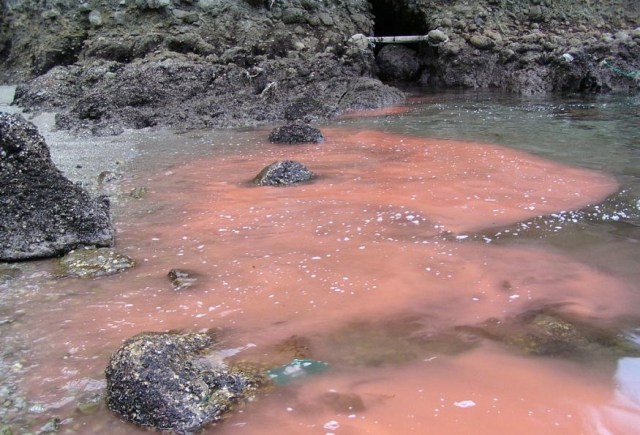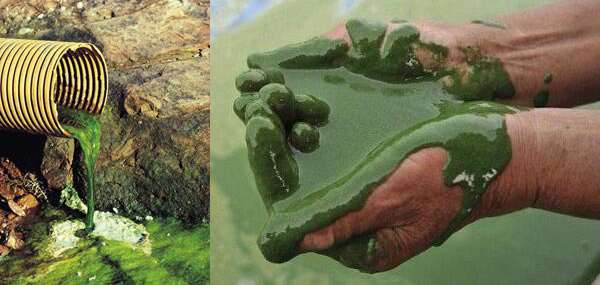water pollution
Japan is one of the cleanest countries you’ll encounter as a traveler. The inside of the bullet train is kept absolutely spotless, taxi drivers can be seen buffing their vehicles of dust and road grit while waiting for the next customer. Graffiti is rare here and men in jumpsuits are employed to scrape off gum and anything else adhered to train station floors. Glamorous and gleaming is the way the Japanese like things. Even diesel trucks are washed down in their terminals after a day on the roads.
So it’s no surprise that the city streets are litter-free, that public trash bins ask you to separate your refuse into burnable and non-burnable bins, or that the Japanese have a reputation for taking their garbage home with them when attending sporting events.
So it may have been a surprise to some of our readers when someone commented on the trashiness of Japanese beaches in response to my previous article on Japanese beach culture, saying: “The number one beach activity in Japan is actually turning it into a giant open dump, full or empty beer cans, cigarette buds, and plastics of all kinds. It’s a big paradox when you see how clean the streets are.”
It’s well-known that China’s struggling with some serious air pollution, but perhaps less talked about is the toll being taken on their rivers. According to a recent survey conducted by Chinese media, 96% of respondents felt that not a single river around them was clean enough to swim in. And judging from these photos, anyone who did decide to risk a dive would probably come out looking worse than the Creature from the Black Lagoon.
The sea is too clean for the fish!
Efforts to clean up the sea have caused an adverse reaction giving the fishing Industries in Hyogo, Okayama, and Oita Prefectures along the Setonai Seaboard a major headache. The irony being that the sea is too clean for the fish to thrive.
An analysis of the sea water by researchers found the natural levels of Nitrogen and phosphorous in the salt content of the sea water needed for the nutritional growth of healthy plankton have diminished to the point that it has effected the natural eco system of the sea. Without enough plankton, the major nutrition for many small sea animals, the whole food chain is disrupted to the point of great loss to the fishing Industry.




 Starbucks Japan releases first-ever Hinamatsuri Girls’ Day Frappuccino
Starbucks Japan releases first-ever Hinamatsuri Girls’ Day Frappuccino The fish in rural Fukui that rivals Japan’s most auspicious sea bream
The fish in rural Fukui that rivals Japan’s most auspicious sea bream Japan Extreme Budget Travel! A trip from Tokyo to Izumo for just 30,000 yen [Part 1]
Japan Extreme Budget Travel! A trip from Tokyo to Izumo for just 30,000 yen [Part 1] Drift ice in Japan is a disappearing winter miracle you need to see now
Drift ice in Japan is a disappearing winter miracle you need to see now The best Japanese cosplayers from Day 4 of Summer Comiket 2019【Photos】
The best Japanese cosplayers from Day 4 of Summer Comiket 2019【Photos】 Japan has only one airport named after a samurai, so let’s check out Kochi Ryoma【Photos】
Japan has only one airport named after a samurai, so let’s check out Kochi Ryoma【Photos】 Which convenience store onigiri rice balls are the most popular? Survey reveals surprising results
Which convenience store onigiri rice balls are the most popular? Survey reveals surprising results Japanese restaurant chain serves Dragon Ball donuts and Senzu Beans this spring
Japanese restaurant chain serves Dragon Ball donuts and Senzu Beans this spring Mr. Sato’s mad Majima cosplay and other outfits from Mafia Day at SoraNews24HQ【Photos】
Mr. Sato’s mad Majima cosplay and other outfits from Mafia Day at SoraNews24HQ【Photos】 Ghibli’s Kiki’s Delivery Service returns to theaters with first-ever IMAX screenings and remaster
Ghibli’s Kiki’s Delivery Service returns to theaters with first-ever IMAX screenings and remaster Highest Starbucks in Japan set to open this spring in the Tokyo sky
Highest Starbucks in Japan set to open this spring in the Tokyo sky The 10 most annoying things foreign tourists do on Japanese trains, according to locals
The 10 most annoying things foreign tourists do on Japanese trains, according to locals Tokyo Skytree turns pink for the cherry blossom season
Tokyo Skytree turns pink for the cherry blossom season Yakuzen ramen restaurant in Tokyo is very different to a yakuza ramen restaurant
Yakuzen ramen restaurant in Tokyo is very different to a yakuza ramen restaurant Shibuya Station’s Hachiko Gate and Yamanote Line stairway locations change next month
Shibuya Station’s Hachiko Gate and Yamanote Line stairway locations change next month Starbucks Japan releases new sakura goods and drinkware for cherry blossom season 2026
Starbucks Japan releases new sakura goods and drinkware for cherry blossom season 2026 Starbucks Japan adds new sakura Frappuccino and cherry blossom drinks to the menu
Starbucks Japan adds new sakura Frappuccino and cherry blossom drinks to the menu Japan’s new “Cunte” contact lenses aren’t pronounced like you’re probably thinking they are
Japan’s new “Cunte” contact lenses aren’t pronounced like you’re probably thinking they are Japan’s newest Shinkansen has no seats…or passengers [Video]
Japan’s newest Shinkansen has no seats…or passengers [Video] Foreigners accounting for over 80 percent of off-course skiers needing rescue in Japan’s Hokkaido
Foreigners accounting for over 80 percent of off-course skiers needing rescue in Japan’s Hokkaido Super-salty pizza sends six kids to the hospital in Japan, linguistics blamed
Super-salty pizza sends six kids to the hospital in Japan, linguistics blamed Starbucks Japan unveils new sakura Frappuccino for cherry blossom season 2026
Starbucks Japan unveils new sakura Frappuccino for cherry blossom season 2026 Foreign tourists in Japan will get free Shinkansen tickets to promote regional tourism
Foreign tourists in Japan will get free Shinkansen tickets to promote regional tourism Take a trip to Japan’s Dododo Land, the most irritating place on Earth
Take a trip to Japan’s Dododo Land, the most irritating place on Earth Naruto and Converse team up for new line of shinobi sneakers[Photos]
Naruto and Converse team up for new line of shinobi sneakers[Photos] Is China’s don’t-go-to-Japan warning affecting the lines at a popular Tokyo gyukatsu restaurant?
Is China’s don’t-go-to-Japan warning affecting the lines at a popular Tokyo gyukatsu restaurant? Survey asks foreign tourists what bothered them in Japan, more than half gave same answer
Survey asks foreign tourists what bothered them in Japan, more than half gave same answer Japan’s human washing machines will go on sale to general public, demos to be held in Tokyo
Japan’s human washing machines will go on sale to general public, demos to be held in Tokyo Starbucks Japan releases new drinkware and goods for Valentine’s Day
Starbucks Japan releases new drinkware and goods for Valentine’s Day We deeply regret going into this tunnel on our walk in the mountains of Japan
We deeply regret going into this tunnel on our walk in the mountains of Japan Studio Ghibli releases Kodama forest spirits from Princess Mononoke to light up your home
Studio Ghibli releases Kodama forest spirits from Princess Mononoke to light up your home Major Japanese hotel chain says reservations via overseas booking sites may not be valid
Major Japanese hotel chain says reservations via overseas booking sites may not be valid Put sesame oil in your coffee? Japanese maker says it’s the best way to start your day【Taste test】
Put sesame oil in your coffee? Japanese maker says it’s the best way to start your day【Taste test】 No more using real katana for tourism activities, Japan’s National Police Agency says
No more using real katana for tourism activities, Japan’s National Police Agency says Japan has only one airport named after a samurai, so let’s check out Kochi Ryoma【Photos】
Japan has only one airport named after a samurai, so let’s check out Kochi Ryoma【Photos】 Which convenience store onigiri rice balls are the most popular? Survey reveals surprising results
Which convenience store onigiri rice balls are the most popular? Survey reveals surprising results Japanese restaurant chain serves Dragon Ball donuts and Senzu Beans this spring
Japanese restaurant chain serves Dragon Ball donuts and Senzu Beans this spring Mr. Sato’s mad Majima cosplay and other outfits from Mafia Day at SoraNews24HQ【Photos】
Mr. Sato’s mad Majima cosplay and other outfits from Mafia Day at SoraNews24HQ【Photos】 Ghibli’s Kiki’s Delivery Service returns to theaters with first-ever IMAX screenings and remaster
Ghibli’s Kiki’s Delivery Service returns to theaters with first-ever IMAX screenings and remaster “Bumping men” are a uniquely Japanese class of criminals that are hard to deal with
“Bumping men” are a uniquely Japanese class of criminals that are hard to deal with Japan’s best train pass, the Japan Rail Pass, finally being made available for purchase online
Japan’s best train pass, the Japan Rail Pass, finally being made available for purchase online Development of Puyo Puyo puzzle game for use in nursing homes underway
Development of Puyo Puyo puzzle game for use in nursing homes underway 7-Eleven Japan’s sakura sweets season is underway right now!
7-Eleven Japan’s sakura sweets season is underway right now! Japan Extreme Budget Travel! A trip from Tokyo to Izumo for just 30,000 yen [Part 2]
Japan Extreme Budget Travel! A trip from Tokyo to Izumo for just 30,000 yen [Part 2] With sushi breakfasts and hot spring baths, this Tokyo hotel could really use a different name
With sushi breakfasts and hot spring baths, this Tokyo hotel could really use a different name Pokémon Master Ball engagement ring case is sure to help you catch your beloved’s heart
Pokémon Master Ball engagement ring case is sure to help you catch your beloved’s heart Highest Starbucks in Japan set to open this spring in the Tokyo sky
Highest Starbucks in Japan set to open this spring in the Tokyo sky